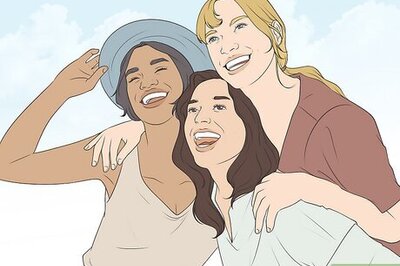
views
"Cuh" Meaning
The word "cuh" is short for "cousin." Like "bro" being short for "brother," this word doesn't actually imply any family relation. It's mostly used as a way to show that you have a close relationship with the person you're referring to as "cuh." Even though "cuh" is a shortened form of an English word, it was originally used by Mexican-Americans. It's not necessarily a racial or ethnic thing, though—more about your age and your friend group. This particular shortened form is used primarily by teenagers and comes after an older generation made another shortened form, "cuz," which is popular to use in the same way. The word "cousin" has been used as a term of address since the early 15th century, so there's nothing new about using this word for people who aren't blood relations.
"Cuh" Usage
Address a friend as "cuh." You can use "cuh" in the same way that you would use a word like "bro" or "bruh," to address a friend. Since "cuh" (and its parent word "cousin") are gender neutral, you might even find that you prefer it. For example, the phrase "no quema cuh," which is also the title of a song by the rapper SingyFry, means "no problem, cousin." Addressing someone as "cuh" can be used to emphasize the closeness of your relationship. For example, if you buy a friend dinner and they offer to pay you back, you might say "don't worry about it, cuh," which implies that you don't mind buying them dinner because you feel really close to them.
Refer to someone you're close to as "cuh." You can also use "cuh" to talk about someone to someone else. When you refer to them as "cuh," you're letting the person you're talking to know that you feel really close to that person, similar to how you might call someone your homie. For example, if a friend mentions they're having car trouble, you might say, "You should talk to my cuh, Pedro! He's a good honest mechanic, he'll set you straight." If someone's talking about someone they don't know but you know them well and like them, you might say, "Oh yeah, Marco, he's my cuh."
End your sentence with the word "cuh." In this situation, "cuh" is less about its actual meaning—it's just a filler word, like saying "yeah" or "right" at the end of a sentence. Just avoid saying it at the end of every sentence, or it could distract from what you're trying to say. For example, you might say, "We drove all day just to get there, cuh. And when we finally got there, they'd already sold everything. It was like we drove out there for nothing, cuh."
Who commonly uses the word "cuh?"
"Cuh" is most commonly used by Mexican-American teenagers. Legend has it that kids living in the Rio Grande Valley (RGV) in Texas first started shortening the word "cousin" or "cuz" to "cuh." Thanks to social media, the word took off and became common all over the country. You can hear the word "cuh" in a lot of rap songs, especially by Mexican-American rappers. It's totally possible that other groups of kids were using "cuh" at the same time, or even before, the kids in the RGV. The truth is that nobody knows for sure who started using it first or exactly when and how it started gathering traction.
What is the "cuh" hairstyle?"
The "cuh" or Edgar is a haircut popular with Mexican-American teens. The Edgar is basically a bowl cut with a small fade on the corner of the sideburns and in the back. The front is cut like a modified Caesar cut, straight across the forehead. This haircut initially became trendy among Mexican-American kids and teens in the RGV, but it quickly became popular nationwide with kids who share a similar culture. It's also called the "cuh" haircut because the word "cuh" is popular with the kids who have their hair cut this way. The teens who have this haircut are often referred to as "Edgars" themselves. While calling someone an "Edgar" might involve some racial or ethnic stereotypes, most of the kids with Edgar or cuh haircuts are just following the latest fashion trend—the haircut doesn't mean any more than that.




















Comments
0 comment